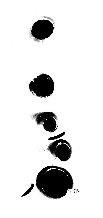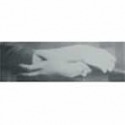cajid 008cd
SPORE
natasha anderson
Spore is a microscopic investigation of the recorder’s anatomy – an interrogation of instrument and performer that comprehensively revolutionizes the language and potential of both. Anderson’s playing constitutes a fluid symbiosis of the bodily and the mechanical – saliva, wood, plastic, metal and circuitry combine to create third-ear beats, super-fast electroacoustics and canonic abjection unified by whiplash phraseology, moody texture and bizarre articulations. Drawing on influences from visual artists Hannah Wilke and Cindy Sherman, texts by Adrienne Rich as well as works by Lachenmann, Pisati and Parmegiani, Spore is striking evidence that the end of instrumental exploration is never in sight.
LISTEN
Hindsight refract (extract) mp3
Spore (extract) mp3
Leach (extract) mp3
REVIEWS
Touching Extremes
Massimo Ricci - February 2007
Focusing on the "microscopic investigation of the recorder's anatomy", Natasha Anderson - a multimedia, improvised and classical musician out of Melbourne - extracts a multitude of flickering, wavering, gurgling and popping tones that maintain a dramatic physicality, impacting against our sense of anticipation with stirring disobedience, our confidence shattered in tatters by spluttering shards of lingual contortions sounding like venomous air bubbles in an underwater conduit, or by whirring continuums that one would imagine as generated by a motorized appliance. To give birth to her improvisations, Anderson uses a wealth of recorders (contrabass in F, middle joints of basses in C & F, tenor, Garklein) processing some of them through Max/MSP; yet the music is permeated by a thoroughly acoustic character for the large part of the album, emphasizing the byproducts of breath and saliva more than "studio difficulties" typical of certain computerized approaches. Anderson saves the best for last, ending the work with a splendid analysis of the lower regions of instrumental resonance quivering with intense undulations and subterranean buzzes, obtained via different layers of looped emissions that flow into a paralyzing silence, ultimately broken by the last few spurts of air.
All Music Guide
François Couture
On Spore, Natasha Anderson unleashes a whole new world of sounds, all related to that much neglected and despised instrument, the recorder. Fearing the headache-inducing high pitch of that elementary school staple? Don't worry, Anderson uses a contrabass recorder, a tenor recorder, and joints from bass recorders, so the whole sonic spectrum of the album is centered on a rather low range. The only other instrument coming into play is the Max/MSP software. Except for a few passages of obvious treatments, you will be hard pressed to draw a line between the acoustic and electronic components of this music. And if the computer expands the possibilities of Anderson's setup, what strikes most in Spore is the wealth of extended techniques the flautist has developed. One thinks of John Butcher and Axel Dörner's microscopic investigation of their instruments (sax and trumpet, respectively), but Anderson's soundworld seems even more alien than theirs. The album consists of three main pieces, two of them subdivided into parts. Each section focuses on a technique, computer setup or approach; the concluding "Leach," the longest piece by far, finds Anderson abandoning thematic research for a holistic application of her discoveries. The result is a gripping piece of subatomic recorder virtuosity. You could listen again and again to Spore, trying to figure out what she does and how she does it, or you could simply accept Anderson's soundworld for the enigma that it is and let yourself be transported, menaced and ravished by it. A very surprising and innovative album.
The Wire
Lawrence English - February 2007
There's little doubt Natasha Anderson's contrabass recorder is a dominating presence in performance. Posed behind what resembles some bastardised periscope, her precise jolts, staps and finger taps evidence her strategic exploitation of the instrument's potential. On /Spore/, composition and performance provoke a cyclical pattern of tension and release -?breath gasped and exhaled - leaving in its wake an explosive spark and splutter of real?time processed audio. The disc collects three discreet compositions that reflect on varying aspects of Anderson's work with recorder and Max/MSP software. Each piece spotlights one particular form of play and process - the instrument and its devolved signal interlocking in a twisted and tightly coiling feedback loop. Opener /“7/11"/ establishes a particularly synthetic multilayered quality, its processed pulse gradually filtered to reveal the bare sound of one instrument and its player.
Much of Spore sounds claustrophobic, with an intimacy that's almost overwhelming_ The sound is close miked and spread across the stereo field, but remains upfront and resoundingly dry. The natural reverb and spatiality of performance is removed and in its place is a sense of intense, even uncomfortable closeness. lf’s an uneasy sensation, captured best on the flatulent gurgling of /"Revenge Of The Head”/, but one that makes this disc all the more satisfying.
Vital Weekly
Frans De Waard - November 2006
Australia's cajid label always takes us by surprise and always seems to be treating us with new musicians, and surprising many of them are female. Natasha Anderson hails from Melbourne and plays contrabass and garklein recorders, which is the smallest soprano recorder. She processes those on the computer. Besides she is a regular improviser with people such as Anthony Pateras, Robin Fox, Annette Krebs and others. One can imagine that her choice of instrument moves between the low and the high end of the sound spectrum. She plays the instruments with wood, plastic, metal, circuitry and saliva and the whole thing comes off a highly interesting form of electro-acoustic music that is most of the times highly vibrant and dynamic. Sometimes the sounds in all directions, bounces back to earth and shoots back into space, but at other times things are slow and peaceful, such as in the last section of title piece, entitled 'leach'. No doubt derived from many hours of improvisation, this is cut short to and collated into what is on this CD, which is a fine combination of onkyo and electro-acoustic music. Great stuff!




